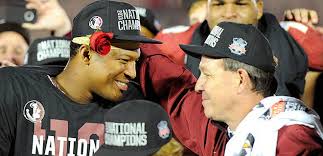by Kent Sterling
NCAA rules prohibit athletes from monetizing their own image, whether it be for video game use, jersey sales, or autograph signings. There is no rule preventing schools from profiting from those images.
That’s a bad rule, and bad rules should be ignored. Civil disobedience is a moral imperative – and an American philosophy that was established simultaneous to the founding of our unique nation.
Click here to follow Kent on Twitter
For selfish reasons, college administrators argue that the status quo is fair because the value of a college education can be worth hundreds of thousands of dollars, and the earnings resulting from a college education can net a former student-athlete millions. That’s all very true, but still does not justify the restriction of financial gain in place while athletes are bound to a university.
There are no such restrictions on any of group of students or individuals, and for a group that often claims its goal is to expose athletes to as similar an experience to normal students as possible, administrators sure do enjoy inserting exceptions whenever it serves their financial purpose.
Running back Todd Gurley remains suspended at Georgia for signing memorabilia for between $8-$25 per piece, and Florida State is examining items authenticated as signed by Winston that are currently for sale online. Winston says he did not receive money for signing anything, according to his coach, Jimbo Fisher.
Fisher has been strident in his defense of the occasionally self-indulgent and reckless Winston, “He’s never taken a dime from anything. He’s signed thousands of things. An hour and a half before a baseball game he signs, an hour and a half after the game. There’s thousands of things out there with his name. He’s very accommodating.”
That doesn’t explain how the authentication of many jerseys and mini-helmets occurred simultaneously. The items were submitted for authentication together, and that would indicate a dealer was involved. Dealers generally pay cash for signatures as famous people are rarely moved to sit and sign for hours without compensation as a profiteer looks on.
Winston is doing the smart thing by denying everything to everyone whether he took cash or not. Neither Florida State University nor the NCAA has subpoena power, and as a result can’t compel anyone to tell the truth. Deny everything and hope the boat carrying the secrets doesn’t leak. That’s the code of the criminal, but if the rule is unjust, where is the crime?
There would be a sack full of unintended consequences for allowing college athletes to sign for cash, but at least that would allow athletes to profit from their own image in the way everyone else in America can. That fairness makes the abolition of this self-serving rule a just act, regardless of the potential abuse that may ensue.
Sure, boosters might line up to hand a player like Winston $500 for signing his name to white panel footballs, and that would make college football a virtual semiprofessional league. You know what though? It already is.
Coaches earn millions, even assistant coaches earn millions. Schools and conferences sign gigantic media partnerships that allow for a lot of others to earn an income far more significant than those of the professors who do the real work at universities.
When the teat is dispensing milk to one sect of calves while others are being excluded only for the purpose of allowing those with access to enjoy more, something must be done. Given the NCAA’s decision to appeal the ruling in the O’Bannon Lawsuit, civil disobedience seems to be a solid alternative.
Winston may be blissfully unaware of the cultural impact of disobedience throughout history, but if enough iconic college athletes sign their names for cash, the universities that comprise the membership of the NCAA will have no choice but to allow athletes to reap rewards for the brands they create with Saturday excellence.
Most of Winston’s idiocy is worthy of the punishment many college football fans – including me – would like to see enacted, but not for signing swag for cash.


